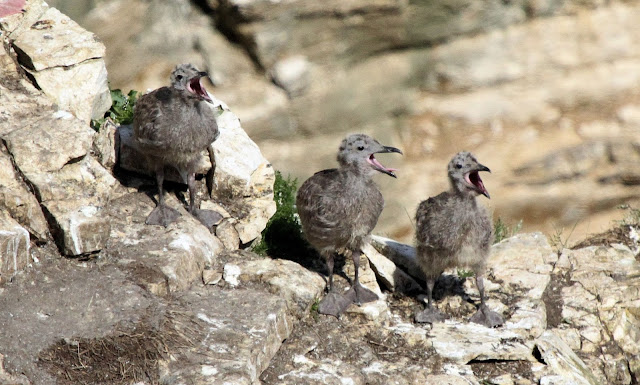For the final session of this term on Friday we headed for what has recently been called, the Great White Cape, surely with more than a touch of irony! We were due to visit last Friday, but the forecast was for rain all day, and that is pretty much what happened after 10.15, but before that apparently there was a report of more Puffins than ever before.
Young Peregrine (c) 2013 Maggie Bruce
Record Shot of Whitethroat
Even before we set off a Yellowhammer could be heard on the wrong side of the car park, and a Whitethroat singing along our intended route. Sure enough when we began the Whitethroat was singing on a wire and then performed its puppet-on-a-string song flight several times. It even had the good manners to sit briefly alongside a male Linnet, so participants could compare and contrast these 2 birds. There weren't as many Linnets as usual here, but House Sparrows had raised their young and House Martins whizzed over our heads. Some Meadow Pipits were perched on the wires and Skylarks could be spotted singing high above our heads.
Marsh Orchid
Skylark
The cliff tops were a riot of colour, mainly consisting of bright yellow Hawkbits interspersed with some stunning purple orchids. A Skylark flew out from under our feet, and I only hope its nest wasn't just off the path because I'm sure it will be trodden on before too long. We also had some better views of Meadow Pipits and these were compared and contrasted with the larger, paler Skylarks. One of the latter even raised its crest, which you never see on Meadow Pipits.
Bridled Guillemot [centre]
Rock Pipit
Ditto
When we reached the chalk cliffs, a great area had been washed away since last year, so the little square with a guaranteed Puffin peering out had disappeared. Kittiwakes, Razorbills and Guillemots were still fairly close though. The former had some young, but the Auks didn't seem to have many offspring at all, and there were even some abandoned eggs. There were some Puffins, but most of these were fairly distant. Steve spotted a small, dark bird on the cliff top, but it disappeared before we were all able to see it. A few minutes later it was relocated by Maggie, and it proved to be a Rock Pipit. It was obviously a lot darker than the Meadow Pipits, seemed a little larger, whilst the legs were quite a different colour.
Puffin [left] in the wrong Queue
Fulmar
Kittiwake
Kittiwake & Chick
The 3 Stooges
Razorbill
Moving on we had our best view of a Fulmar, plus several birds panting to try and lose heat, including a single Razorbills, several Kittiwakes and their chicks, plus 3 Herring Gulls. Not long after this Maggie got rather excited when she spotted a mustelid, which she described as rather dark and large. Several minutes later and much further along the cliff top a Weasel's head popped out among the grass stalks. It went away and then came a little forward again, and kept repeating this action, before it eventually determined to plunge forward along a small crack. It appeared we were standing right above its burrow, and our presence deterred the weasel from returning for some time. However, the lure of the young in the nest proved too strong and the Weasel ignored the looming threat of us, and plunged into its lair. We didn't see it again, but we were able to snatch some pictures before it went out of view.
Weasel
Ditto
Roe Deer
Adult Peregrine with Immature Auk
Peregrine
Adult Peregrine Passing Auk to Offspring
Ditto
Immature Mantling its Catch
Young Peregrine 2 Days Later (c) 2013 Maggie Bruce
Young Peregrine & Food (c) 2013 Maggie Bruce
We walked through some very long grasses and the best sighting here was a leaping Roe deer. A Heron attempted to fly over, but it was mobbed by a Lapwing until it settled well away from the Lapwing's nest. Looking towards the cliffs we could see a huge column of swirling gulls, and wondered what this sighting portended. One suggestion proved entirely correct as we made our way to this place, and saw a Peregrine flying around. At first all the birds were spotted were youngsters, but eventually we realised that a parent bird had caught either an immature Razorbill or Guillemot and was then trying to ensure its offspring were able to snatch it in flight. A skill they will need if they are to gain their independence. We probably watched for 10 minutes or so and one of the youngsters mantled its prey right under our noses. What a way to round off the Spring/Summer term. However, this wasn't enough for Maggie who returned to the site after a weekend in London. Her perseverance was rewarded with some amazing pictures.





























1 comment:
Not a bad day out then?
Post a Comment